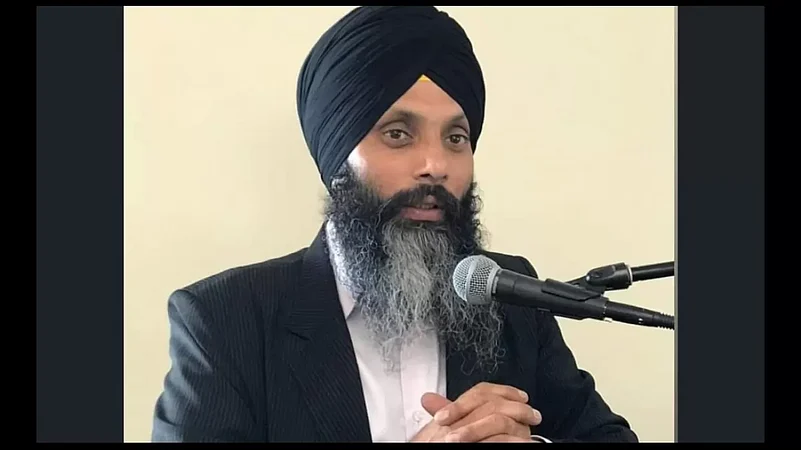Khalistani terrorist Hardeep Singh Nijjar, whose killing is at the centre of an ongoing confrontation between India and Canada, had organised arms training camp in Canada and had facilitated terror attacks in India, according to reports.
Nijjar, a designated terrorist, was killed in Surrey in Canada's British Columbia province in June. Earlier this week, Canadian Prime Minister Justin Trudeau claimed that India could be behind Nijjar's killing. The Canadian government followed the statement with the expulsion of a senior Indian diplomat posted in Canada. It also named the diplomat publicly as and Indian intelligence agency's official. India has also since responded forcefully, rubbishing Trudeau's claim, expelling a Canadian diplomat understood to be Canadian intelligence official, suspending visa service to Canadians, and ordering the downsizing of Canadian missions in India.
Nijjar was the chief of Khalistan Tiger Force (KTF), a designated terrorist organisation part of the Khalistan movement.
For years, the India-Canada relations have been strained over the Canadian indifference to Khalistani elements operating from the country, which carry out anti-India activities such as secessionist politics, organised crime, and terrorist conspiracies from Canadian soil. The ties have been further stressed since Trudeau became the Prime Minister of Canada as he, his government, and his allies have been overly tolerant to these extremist elements' activities.
Now, reports have surfaced sharing that Nijjar was not just engaged in facilitating attacks in India, but he also organised an arms training camp in Canada. Earlier, videos of Nijjar using automatic weapons have surfaced.
The Khalistan movement refers to the movement for the creation of a separate nation for Sikhs called Khalistan, which the supporters of the movement seek to carve out of India. For decades, the movement waged a bloody insurgency in Indian that finally ebbed in 1990s. While the insurgency ebbed in India in 1990s, the movement has a strong presence in pockets abroad, such as in Canada where it has found a safe haven. From such safe havens, the Khalistan movement continues to attempt to execute nefarious designs against India. Lately, Khalistani elements have attacked Indian missions, threatened Indian diplomats, threatened the Hindus in Canada, vandalised Hindu temples, and assaulted journalists in Canada, United States, and the United Kingdom.
Nijjar organised arms training camp in Canada
In 2015, KTF chief Hardeep Singh Nijjar organised an arms training camp in Canada's British Columbia province, according to reports.
At the camp, training related to Ak-47, sniper rifle, and pistols were provided, according to India Today.
Citing an India dossier against Nijjar, India Today reports that Mandeep Singh Dhaliwal was among those who received the training. Following the training, he was sent to India to carry out an attack.
"In January 2016, Nijjar sent Dhaliwal to Punjab to kill Shiv Sena leaders and create a communal situation in the state. However, in June of that year, Punjab Police caught Dhaliwal...The National Investigative Agency (NIA) registered several cases against Nijjar in which there were allegations of setting up a module in Canada related to Mandeep Singh Dhaliwal," reported India Today.
Nijjar's role in attacks in India
The foiled attack through Dhaliwal was not the only instance that Nijjar targeted India.
In 2010, Nijjar was named in a bombing in Patiala in Punjab in which four persons were injured. The accused arrested in the case, Ramandeep Singh, revealed that Nijjar "was involved in providing financial assistance for carrying out the attack", reported India Today.
In 2014, Nijjar planned an attack on religious personality Baba Piara Singh Bhaniarawala.
"In 2014, Surjit Singh Kohli, a Canadian national, visited India at the behest of Nijjar. He motivated one former BKI terrorist Parminder Singh for the killing of Baba Piara Singh Bhaniarawala, a socio-religious head and Sanjeev Ghanauli, a Shiv Sena leader for their alleged role in anti-panthic activities," reported India Today.
NDTV further reported that Nijjar had built a module, which involved another designated terrorist Arshdeep Singh Gill alias Arsh Dala, and was involved in more plots in India.
"In 2014, Nijjar allegedly planned to execute a terror attack on Dera Sacha Sauda Headquarters in Haryana's Sirsa, but he couldn't reach India, the dossier said, so he directed his module to target former DGP Mohd Izhar Alam, Punjab based Shiv Sena leader Nishant Sharma, and Baba Mann Singh Pehowa Wale...He allegedly tasked Arshdeep to carry out the double-murder of Manohar Lal Arora and Jatinderbir Singh Arora, the father-son duo accused of 'anti-Panthic activities', in 2020. In the attack, Manohar Lal was shot dead at his residence in Bathinda on November 20, 2020, but his son escaped. Nijjar had sent money from Canada for their murder, the dossier said," reported NDTV.
Nijjar's link with Pakistan
Hardeep Singh Nijjar has also been to Pakistan where he received training, according to reports.
The Pakistan spy agency ISI has been central in cultivating, sustaining, and spreading the Khalistan movement.
It was in Pakistan where he met the former KTF chief Jagtar Singh Tara, who he succeeded as KTF chief later.
"He visited Pakistan in April 2012 under the guise of being a Baisakhi Jatha member. According to sources, Nijjar was radicalised by Tara and groomed by the ISI, who gave him arms and explosives training in 2012 and 2013. Nijjar joined KTF after Tara became the outfit's chief in 2013. Thereafter, he visited Pakistan to hold meetings with Tara and ISI officials in 2013 and 2014 for the strengthening of KTF and organising terrorist activities in Punjab," reported India Today.
India has rejected Trudea's claim of any potential involvement in Nijjar's killing. Trudeau has, however, continued to press his claim and the government has further claimed that it has human as well as technical intelligence to back its claims. The US envoy to Canada David Cohen has also confirmed that a 'Five Eyes' ally had provided intelligence to Canada. The Five Eyes is an intelligence-sharing alliance comprising the United States, UK, Canada, Australia, and New Zealand.


























